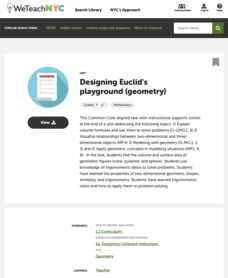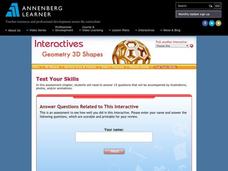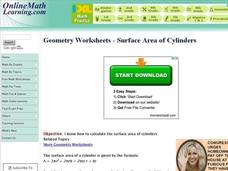Virginia Department of Education
Exploring 3-D Geometry
Take young mathematicians on an exploration of the world of 3-D geometry with this seven-lesson unit. After first defining the terms perimeter, area, and volume and how they apply to the real world, students continue on...
Radford University
Building Sandcastles
Finalize the plans before playing in the sand. Learners design sandcastles using geometric and composite figures. They create blueprints, including the scale, and three-dimensional models of their castles. Finally, scholars calculate the...
New York City Department of Education
Designing Euclid’s Playground
Create a geometric playground. Pupils work through a performance task to demonstrate their ability to use geometric concepts to solve everyday problems. The accompanying engineering design lessons show teachers how the assessment works...
Mathed Up!
Volume and Surface Area of a Cylinder
The measurements are all in the can. The review for the math portion of the General Certificate of Secondary Education assessments provides scholars the opportunity to review finding volume and surface area of a cylinder. Pupils work on...
Concord Consortium
Swimming Pool I
Take a dive into a three-dimensional task. Given a specific surface area, individuals must maximize the volume of a cylindrical swimming pool. They combine their understanding of surface area and volume to create a cubic function that...
Annenberg Foundation
Geometry 3D Shapes: Test Your Skills
Time to find out what they've learned! The final lesson of a five-part series has learners complete a 39-question multiple choice review. They use what they've learned in the previous lessons to complete questions that include concepts...
Annenberg Foundation
Geometry 3D Shapes: Surface Area and Volume
Whether you wrap it or fill it, you're using geometric concepts. Classmates use an interactive approach to learn how to find volume and surface area of cylinders and prisms in the second lesson in a five-part series. The online lesson...
101 Questions
Toilet Paper Roll
You won't want to flush a great lesson down the drain! An intriguing resource asks learners to predict the number of sheets of toilet paper on a roll. Presented with the dimensions of the roll and one sheet of paper, scholars make...
Virginia Department of Education
Surface Area and Volume of a Cylinder
Surface area or volume? Pupils first review the difference between surface area and volume. They then use a two-dimensional net that helps them develop formulas for the surface area and volume of cylinders.
Virginia Department of Education
Surface Area and Volume
Partners use materials to wrap three-dimensional objects to determine the formula for surface area. The groups use an orange to calculate the amount of peel it takes to completely cover the fruit. Using manipulatives, individuals then...
Mathematics Assessment Project
Sports Bag
Why not give surface area of cylinders a sporting chance in your classroom? A strategic problem-solving task requires pupils to consider the net of a cylinder. Individuals must determine the sizes of the pieces needed to make a...
Mathematics Assessment Project
Funsize Cans
Designing fun-size cans ... what fun! Class members use the provided questions to determine the dimensions of a can with a minimum surface area for a given volume. The task allows learners to use graphs or algebraic manipulation to...
Mathematics Assessment Project
Bestsize Cans
Traditional calculus problem made simple. In the high school assessment task, learners determine the minimum surface area for a can of a given volume using algebraic and numerical methods to solve the problem. No calculus...
Willow Tree
Surface Area of Three-Dimensional Figures
Lateral area and surface area are simple concepts, but calculating them is not as easy! Using formulas, learners calculate lateral area and surface area for the same three-dimensional figures. The resource discusses the formula variables...
Illustrative Mathematics
How Thick Is a Soda Can I?
The humble soda can gets the geometric treatment in an activity that links math and science calculations. After a few basic assumptions are made and discussed, surface area calculations combine with density information to develop an...
Illustrative Mathematics
How Thick Is a Soda Can II?
Science, technology, and math come together in this one combination exercise. Analyzing the common soda can from both a purely mathematical perspective and a scientific angle allows for a surprisingly sophisticated comparison of...
Mrs. Burke's Math Page
Let Them Eat Pi
Looking for a fun and creative way to celebrate Pi Day? Then this is the resource for you. From a scavenger hunt and trivia contest to PowerPoint presentations and skills practice worksheets, this collection of materials is a...
Curated OER
Measurement: Cylinders
Math scholars observe and demonstrate how to calculate the surface area and volume of cylinders. They analyze pictures of various cylinders on a handout, solve problems on two worksheets independently, and discuss the answers to the...
Curated OER
Geometry Worksheets - Surface Area of Cylinders
In this online math worksheet, students determine the surface area of cylinders given their interior dimensions. This excellent resource allows the students to check their answers, and to get "hints" should they run into difficulties. A...
University of Regina (Canada)
University of Regina: Math Central: Surface Area to Volume Ratio
Students will investigate the relationship between surface area and volume and their application to the inner workings of real life organisms.
CK-12 Foundation
Ck 12: Geometry: Surface Area of Cylinders
[Free Registration/Login may be required to access all resource tools.] Find the surface area of cylinders using formulas
CK-12 Foundation
Ck 12: Geometry: Surface Area of Cylinders
[Free Registration/Login may be required to access all resource tools.] Use a formula and given information to find the surface area of different cylinders.























